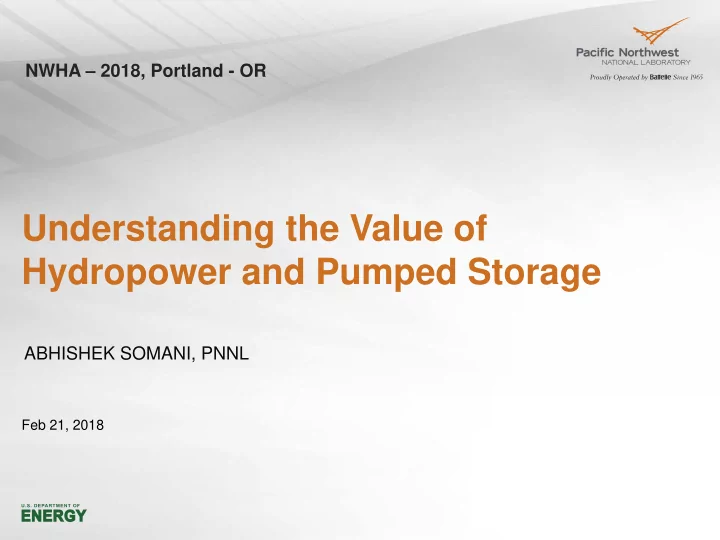

NWHA – 2018, Portland - OR Understanding the Value of Hydropower and Pumped Storage ABHISHEK SOMANI, PNNL Feb 21, 2018
DOE Initiatives on Valuation of Pumped Storage and Hydropower In July 2016, the Hydropower Vision Report illustrated some of the challenges and opportunities to expansion of hydropower In January 2017, the Quadrennial Energy Review (QER) Second Installment documented the rising importance of resiliency and stated that traditional methods of valuation are “strained” under the electric system’s technology evolution. In August 2017, the Staff Report to the Secretary on Electricity Markets and Reliability pointed out that along with traditional thermal resources, hydropower plants “provide essential reliability services… critical to system resilience.” 2
Projects Initiated in FY17-18 DOE (WPTO) is initiating a new research strategy around the value and valuation of hydropower and pumped storage resources Hydropower Value Study Project funding - $1.5 M Techno-Economic Studies for Valuation of Pumped-Storage Hydropower Project funding - $3 M The projects are aimed at understanding the full potential of the hydropower fleet, including pumped storage, to contribute to electric grid resiliency and reliability 3
Hydropower Value Study Study funded by Department of Energy’s (DOE’s) Water Power Technologies Office (WPTO) Project Team: Argonne National Laboratory (Argonne) Idaho National Laboratory (INL) National Renewable Energy Laboratory (NREL) Oak Ridge National Laboratory (ORNL) Pacific Northwest National Laboratory (PNNL) – Project Lead Timeline Start date: January 2018 End date: December 2018 4
Project Overview Motivating questions: How is hydropower currently contributing to grid services? What services/capabilities will be needed by the grid in the future? Can hydropower provide the services based on technical capability and cost? Project intent: Foundational work to understand present hydropower operations trends, future expected changes, and hydropower capabilities analysis Project design: Will involve extensive data collection and analysis on market participation trends, operational practices, and technological capabilities Will not involve design of new market rules, hydro operations models/tools Expected outcomes: Comprehensive understanding of hydropower’s evolving value proposition Understanding of high-impact future research needs – research roadmap 5
Project Tasks: Task 1 – Current landscape review Market participation trends in different regions Correlation analysis with other system variables, such renewables Market participation rules and procedures in different regions Estimation of value from services not presently monetized, such as inertia Case studies on water management practices, and their impact on operations Task 2 – Future system needs & hydropower value Future power system scenarios and resulting value drivers for hydropower Hydropower value proposition in future based on system needs Task 3 – Hydropower capabilities & gap analysis Comparison of current power system and hydro operations timelines Baseline capabilities of existing units, facilities, and systems Cost analysis to operate hydro facilities differently to provide future grid services 6
Task Structure and Information Flow Task 2 Future System Needs & Hydropower Value Deliverable / data flow Grid services System operational and planning needs Delta [services, $] - scenarios presently Changing value drivers Delta[S] $] provided by Evolving market services requirements Delta[services] hydropower Grid services value in future Delta[services] <-> Delta[$] - design scenarios Task 1 Current Landscape Analysis Deliverable / data flow Baseline market operations [services, $, operations] Hydropower Grid services Market data analytics [services, $] capability to needed in the Market rules [services,$] <-?-> [services,operations] provide services future needed in future Water management & regulations [services, operations] Task 3 Hydropower Capabilities & Gap Analysis Deliverable/ data flow Hydropower Baseline hydropower physical operations Delta [services, operations] - scenarios capability to Hydrofacilities' capabilities [operations] operate differently Baseline and evolving costs [operations, costs] and Delta[operations,cost] and associated cost Hydropower value in future Delta[operations] <-?-> Delta[services] 7
Industry Outreach Project specific engagement: Identify, collect, and analyze hydropower operations data as it relates to provision of grid services Identify present and future regulatory and market issues affecting operations and value access Document water management practices and their impacts on dispatch Analyze and validate the study results and propose refinements Long-term strategic engagement: Help identify the highest value research topics to help shape DOE’s research agenda in the future Outreach activities: Technical Advisory Group (TAG) participation in reviews and workshops 8
Techno-Economic Studies for Valuation of Pumped-Storage Hydropower Study funded by Department of Energy’s (DOE’s) Water Power Technologies Office (WPTO) Initiated by Congressional budget language setting aside $3M for the analysis of value of PSH at two sites in areas with high RE generation Project Team: Argonne National Laboratory (Argonne) (Project Lead) Idaho National Laboratory (INL) National Renewable Energy Laboratory (NREL) Oak Ridge National Laboratory (ORNL) Pacific Northwest National Laboratory (PNNL) 9
Project goals and objectives Objective: Advance the state-of-the-art in the assessment of value of PSH plants and their role and contributions to the grid Specific goals: 1. Develop a comprehensive, replicable, and transparent valuation methodology (framework, guidance, or process) that will allow for consistent valuation assessments and comparisons of PSH projects 2. Test the PSH valuation methodology by applying it to two PSH projects 3. Transfer and disseminate the PSH valuation methodology to the hydropower industry, PSH developers, and other stakeholders 10
Contact Abhishek.Somani@pnnl.gov 11
Recommend
More recommend